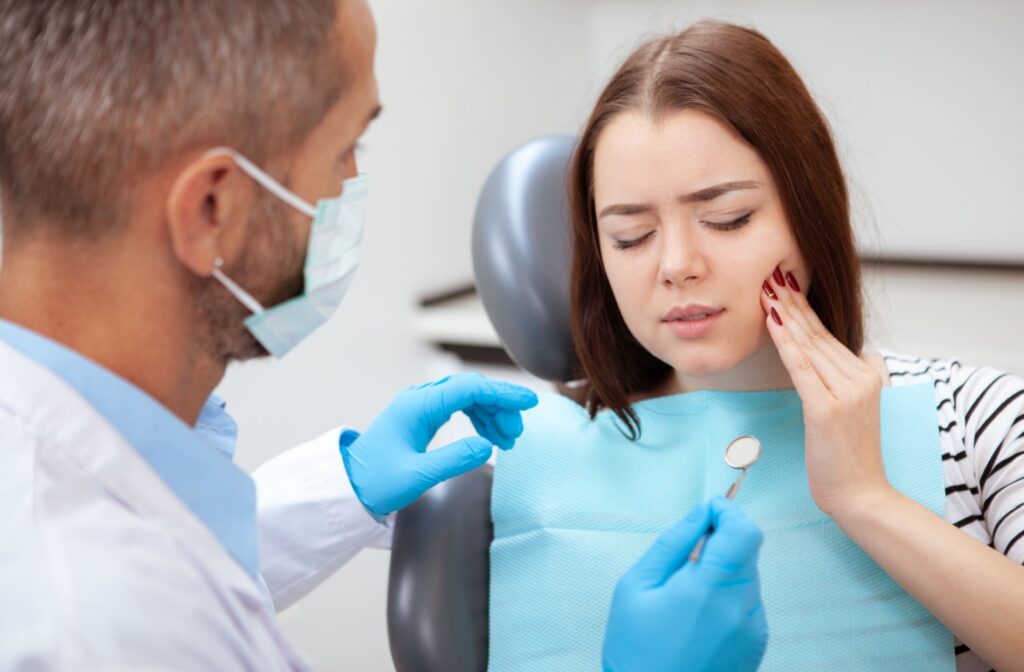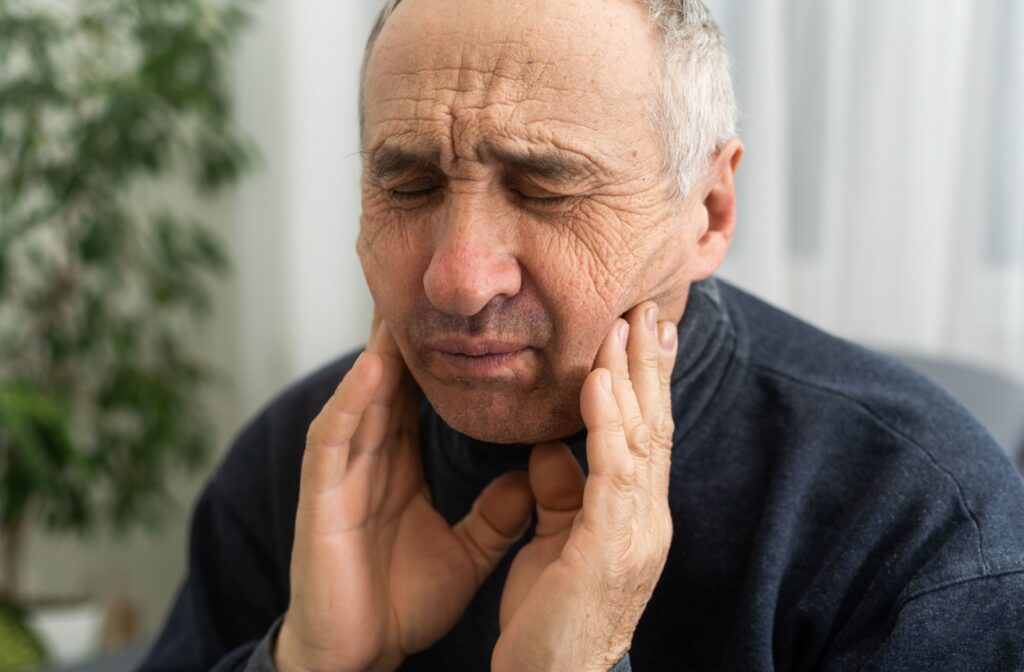
Headaches can be frustrating and debilitating, often prompting us to seek the comfort of a dark, quiet room. But what if the culprit behind your headache is something as unexpected as a toothache?
Tooth pain is notoriously tricky to handle—sometimes requiring emergency dental care—and can cause headaches if left untreated.
The cause of a toothache or headache isn’t always apparent. And sometimes, it’s not even directly related to your teeth.
Temporomandibular joint disorder (TMJD) can extend its influence from your jaw throughout key facial muscles and nerves, eventually sparking a headache. So, if you’re grappling with a relentless headache, the real remedy might lie with your dentist’s office.
Toothaches, Headaches, & Jaw Pain
Toothaches can lead to headaches, but the underlying mechanism is complex.
The trigeminal nerve is the most prominent of your brain’s 12 cranial nerves. The nerve’s primary role is conveying sensory details—like touch, temperature, and discomfort—to your facial skin, sinuses, and mucous layers.
The trigeminal nerve is also the pathway for pain from toothaches and headaches.
When teeth ache, the sensation can migrate via the trigeminal nerve to various head regions, including your sinuses and temples, potentially triggering a headache. The reverse can also be true: a headache or migraine can sometimes result in a toothache.
With such a complex network of nerves linking your body, identifying the exact source of pain can be challenging. Thankfully, your dentist can trace the oral problems responsible for the discomfort across your head.
Understanding Toothaches
A toothache represents general discomfort surrounding your teeth and gums. The sensation can range from mild and sporadic to severe and unrelenting.
Toothaches, whether mild or severe, should never be ignored. Although not typically life-threatening, underlying dental issues rarely resolve on their own and can result in serious health risks.
Indicators of toothaches can include:
- Throbbing discomfort
- Swollen gums or teeth
- Sensitivity to temperature changes
- Tenderness around the affected area
- Burning or electric shock-like sensation
- Sharp discomfort when biting or under pressure
- Fever
You won’t necessarily experience all these symptoms, so listening to what your body tells you is essential.
What Leads to Toothaches?

There is simply no one-size-fits-all answer for what causes a toothache, highlighting the importance of a trip to your dentist when the discomfort happens. Some possible sources of a toothache include:
- Gum inflammation
- Tooth decay (cavity)
- Fractured teeth
- Dental abscesses
- Damaged fillings
- Bruxism (teeth grinding)
Tooth decay is the primary cause of cavities and frequently causes toothaches, especially if left untreated. Cavities form when plaque metabolizes sugars and starches into acids, eroding enamel and creating holes.
Once the tissue inside the tooth (pulp) containing nerves and connective tissue becomes infected, you’ll likely experience severe discomfort.
Bruxism
Bruxism involves involuntary teeth grinding or jaw clenching. Many people affected by it are unaware of their condition. The intensity of bruxism can fluctuate throughout a person’s life, and persistent or severe cases may result in dental and health issues, including headaches.
Bruxism is typically triggered by:
- Stress
- Anxiety
- Sleep disturbances
- Misaligned, missing, or crooked teeth
Nighttime bruxism often manifests as morning jaw soreness or headaches. Alternatively, a sleep partner might point out nighttime grinding sounds.
Chronic bruxism can cause:
- Jaw & tooth soreness
- Stiff facial & jaw muscles
- Tooth fractures
- Temperature sensitivity
- Ear discomfort
- Headaches
Temporomandibular Joint Disorders
While headaches often draw attention above the eyebrows, the issue could originate from your jaw. Your temporomandibular joint (TMJ) near your ear could be the source. The complex joint, with its muscles and ligaments, is crucial for talking, chewing, yawning, and swallowing.
Dysfunction in the TMJ can result in discomfort extending to your temples, head, and neck, known as a TMJ disorder (TMD or TMJD).
The cause of TMD is often unclear, though stress frequently plays a role. Other potential causes include:
- Teeth grinding
- Jaw clenching
- Facial trauma
- Rheumatoid arthritis
- Jaw misalignment
- Problems with gums
- Poorly fitted dentures
- Habits like chewing on non-food items
Symptoms vary, but the discomfort can disrupt your daily life. It’s time to visit your dentist if you experience persistent symptoms, including:
- Pain in the neck, jaw, face, shoulders, or head
- A jaw that feels “stuck” or “locked”
- Popping noise when opening your mouth
- Difficulty chewing or bite discomfort
- Unexplained headaches
Less Aching Teeth, More Happy Smiles
Toothaches can be linked to headaches. Fortunately, treating a toothache may also alleviate your headache. If you’re suffering from both, the team at Cool Dental is ready to help.
We can identify the root cause of your toothache—whether it’s decay, bruxism, TMD, or another issue—and provide the care you need. Contact us today to schedule a dental exam, and let’s pave the way to a more comfortable smile!


